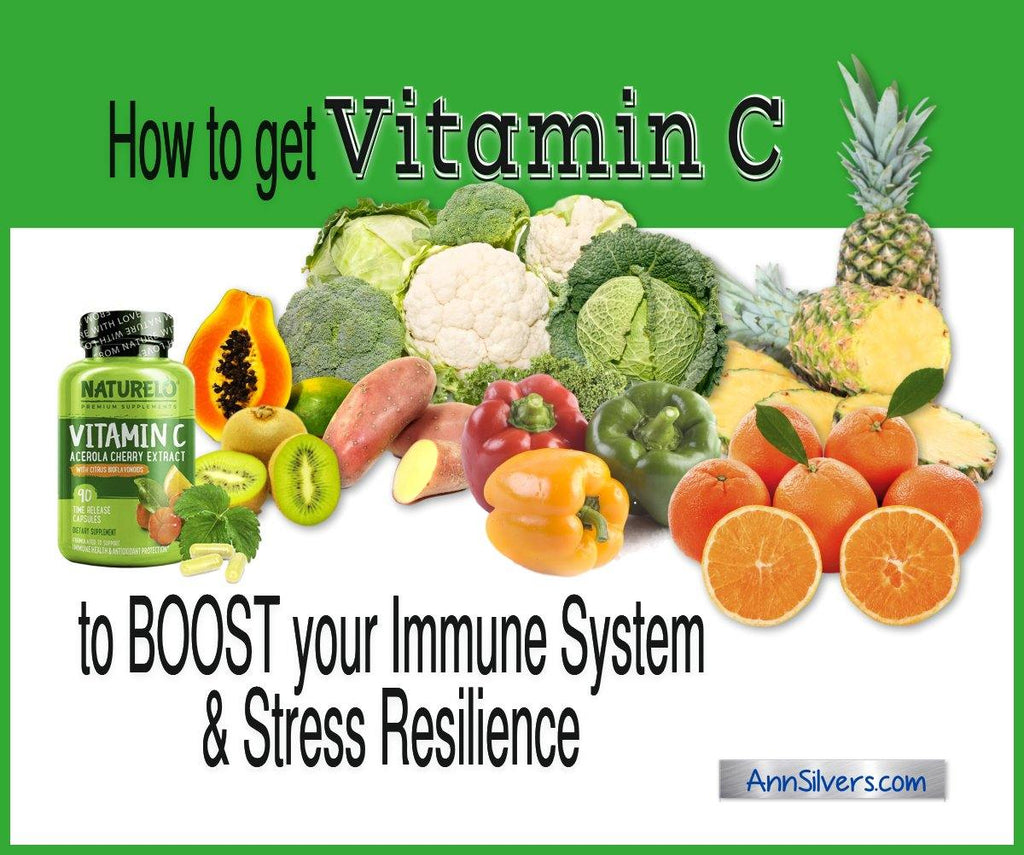How to Get Vitamin C for Immune Support, Stress Resilience, and Anxiety Relief

Most people know that vitamin C can help you fight off a cold or flu, but did you know that it can help you deal with stress and reduce anxiety?
Two places in your body that are crucial to how you deal with stress and whether it becomes anxiety are your brain and your adrenal glands. They are also two of the places in your body with the highest concentration of vitamin C.
What You’ll Learn in This Vitamin C Stress Support Quick Guide
| How to Get Vitamin C: What to Look for in Vitamin C Supplements |
| Recommended Daily Amounts of Vitamin C for Men and Women |
| How to Get Vitamin C: Vitamin C Food Sources |
| Maximizing the Vitamin C in Foods |
Notes: This article is a summary of my research. It should not be taken as medical advice. Check with your personal doctor and medical professionals for personal advice.
How to Get Vitamin C: What to Look for in Vitamin C Supplements
Vitamin C supplements have been around a long time, and I used to think that they were straightforward, all good. I was wrong.
There is a big difference between lab-created vitamin C and food-sourced vitamin C. The typical vitamin C supplement contains ascorbic acid, which is a synthetic ingredient made in a lab from corn syrup (probably from GMO corn unless clearly marked non-GMO). In nature, ascorbic acid is found with other nutrients, not as a stand-alone.
Dr. Leslie Korn writes in Nutrition Essentials for Mental Health: A Complete Guide to the Food-Mood Connection, “A good vitamin C is a complex (not just ascorbic acid) and contains bioflavonoids and rutin.”(1) Some natural vitamin C supplements contain citrus bioflavonoids or buckwheat berry sprouts, both of which include rutin.
Here are examples of food-sourced vitamin C supplements that include bioflavonoids and rutin and are non-GMO:
- Pure Synergy, Pure Radiance C
- Garden of Life, Raw Vitamin C
- Naturelo, Vitamin C Organic Acerola Cherry with Citrus Bioflavinoids
The best way to get a high-quality C may be in a food-sourced multivitamin, such as that made by Garden of Life, where you can take it in with the B complex of vitamins also. (Both vitamin C and B complex are helpful for lowering anxiety and increasing stress resilience.)
Garden of Life, MyKind Organics Multivitamins, made from organic food, are formulated for different genders and age groups:
Recommended Daily Amounts of Vitamin C for Men and Women
Vitamin C has different Recommended Daily Amount (RDA) values for smokers and non-smokers.
RDA (mg/day)
- Men, non-smokers: 90
- Men, smokers: 125
- Women, non-smokers: 75
- Women, smokers: 110
UL (mg/day)
- Men/Women: 2000
Supplementation dosage recommendation (mg/day) for men and women
- 200–2000 (PDR for Nutritional Supplements (2))
How to Get Vitamin C: Vitamin C Food Sources
We’re all pretty familiar with oranges and other citrus fruits, like grapefruit, being a good source of vitamin C. You may be more surprised by some of the vegetable sources for this vitamin.

| FOOD | Approx. mg per serving | |
| 1 | Papaya | 200 (1/2 of large fruit) |
| 2 | Cruciferous vegetables (broccoli, cauliflower . . .) |
180 (1 cup raw) 100 (1 cup cooked) |
| 3 | Pineapple | 100 (1 cup) |
| 4 | Sweet red pepper | 100 (1/2 cup raw) |
| 5 | Kale |
80 (1 cup raw) 50 (1 cup cooked) |
| 6 | Orange | 70 (1 fruit) |
| 7 | Kiwi | 60 (1 fruit) |
| 8 | Sweet green pepper | 60 (1/2 cup raw) |
| 9 | Potato | 40 (medium, baked) |
Maximizing the Vitamin C in Foods
Vitamin C in foods can be destroyed by heat or light, and it deteriorates over time with exposure to air. Don’t overprocess or overcook peppers and other vitamin C foods. Eating them raw and fresh will maximize their benefit. You can cook them lightly, but don’t overdo the exposure to heat.
Note: I've included links for products and referenced books for your convenience. I may receive a small commission for sales through these links but it doesn't impact your price or my choice to mention a product.
References
(1). Leslie E. Korn, Nutrition Essentials for Mental Health: A Complete Guide to the Food-Mood Connection (New York: W. W. Norton, 2016), 227.
(2). Sheldon Saul Hendler and David M. Rorvik, PDR for Nutritional Supplements (Montvale, NJ: Thomson Reuters, 2008), 665.
- Ann Silvers








Comments 0